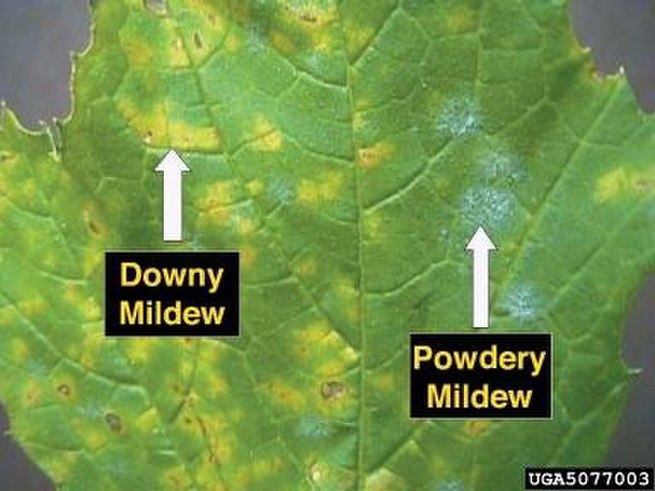
-
Mildew
Mildew is a form of fungus. It is distinguished from its closely related counterpart, mold, largely by its color: moulds appear in shades of black, blue, red, and green, whereas mildew is white. It appears as a thin, superficial growth consisting of minute hyphae (fungal filaments) produced especially on living plants or organic matter such as wood, paper or leather. Both mould and mildew produce distinct offensive odors, and both have been identified as the cause of certain human ailments.
In horticulture, mildew is either species of fungus in the order Erysiphales, or fungus-like organisms in the family Peronosporaceae. It is also used more generally to mean mould growth. In Old English, mildew meant honeydew (a substance secreted by aphids on leaves, formerly thought to distill from the air like dew), and later came to mean mould or fungus.
-
Mold
A mold (US) or mould (UK / NZ / AU / ZA / IN / CA / IE) is a fungus that grows in the form of multicellular filaments called hyphae. In contrast, fungi that can adopt a single-celled growth habit are called yeasts.
Molds are a large and taxonomically diverse number of fungal species in which the growth of hyphae results in discoloration and a fuzzy appearance, especially on food. The network of these tubular branching hyphae, called a mycelium, is considered a single organism. The hyphae are generally transparent, so the mycelium appears like very fine, fluffy white threads over the surface. Cross-walls (septa) may delimit connected compartments along the hyphae, each containing one or multiple, genetically identical nuclei. The dusty texture of many molds is caused by profuse production of asexual spores (conidia) formed by differentiation at the ends of hyphae. The mode of formation and shape of these spores is traditionally used to classify molds. Many of these spores are colored, making the fungus much more obvious to the human eye at this stage in its life-cycle.
Molds are considered to be microbes and do not form a specific taxonomic or phylogenetic grouping, but can be found in the divisions Zygomycota and Ascomycota. In the past, most molds were classified within the Deuteromycota.Molds cause biodegradation of natural materials, which can be unwanted when it becomes food spoilage or damage to property. They also play important roles in biotechnology and food science in the production of various foods, beverages, antibiotics, pharmaceuticals and enzymes. Some diseases of animals and humans can be caused by certain molds: disease may result from allergic sensitivity to mold spores, from growth of pathogenic molds within the body, or from the effects of ingested or inhaled toxic compounds (mycotoxins) produced by molds.
-
Mildew (noun)
A growth of minute powdery or webby fungi, whitish or of different colors, found on various diseased or decaying substances.
-
Mildew (verb)
To taint with mildew.
-
Mildew (verb)
To become tainted with mildew.
-
Mold (noun)
A hollow form or matrix for shaping a fluid or plastic substance.
-
Mold (noun)
A frame or model around or on which something is formed or shaped.
-
Mold (noun)
Something that is made in or shaped on a mold.
-
Mold (noun)
The shape or pattern of a mold.
-
Mold (noun)
General shape or form.
“the oval mold of her face”
-
Mold (noun)
Distinctive character or type.
“a leader in the mold of her predecessors”
-
Mold (noun)
A fixed or restrictive pattern or form.
“His method of scientific investigation broke the mold and led to a new discovery.”
-
Mold (noun)
A group of moldings.
“the arch mold of a porch or doorway;”
“the pier mold of a Gothic pier, meaning the whole profile, section, or combination of parts”
-
Mold (noun)
A fontanelle.
-
Mold (noun)
A natural substance in the form of a woolly or furry growth of tiny fungi that appears when organic material lies for a long time exposed to (usually warm and moist) air.
-
Mold (noun)
Loose friable soil, rich in humus and fit for planting.
-
Mold (noun)
Earth, ground.
-
Mold (verb)
To shape in or on a mold.
-
Mold (verb)
To form into a particular shape; to give shape to.
-
Mold (verb)
To guide or determine the growth or development of; influence
-
Mold (verb)
To fit closely by following the contours of.
-
Mold (verb)
To make a mold of or from (molten metal, for example) before casting.
-
Mold (verb)
To ornament with moldings.
-
Mold (verb)
To be shaped in or as if in a mold.
“These shoes gradually molded to my feet.”
-
Mold (verb)
To cause to become moldy; to cause mold to grow upon.
-
Mold (verb)
To become moldy; to be covered or filled, in whole or in part, with a mold.
-
Mold (verb)
To cover with mold or soil.
-
Mold (noun)
a town in north-eastern Wales, administrative centre of Flintshire; population 10,500 (est. 2009).
